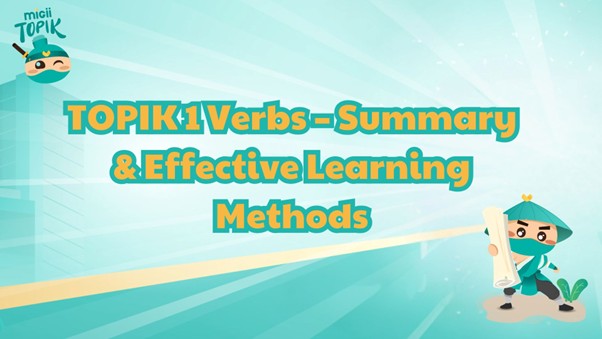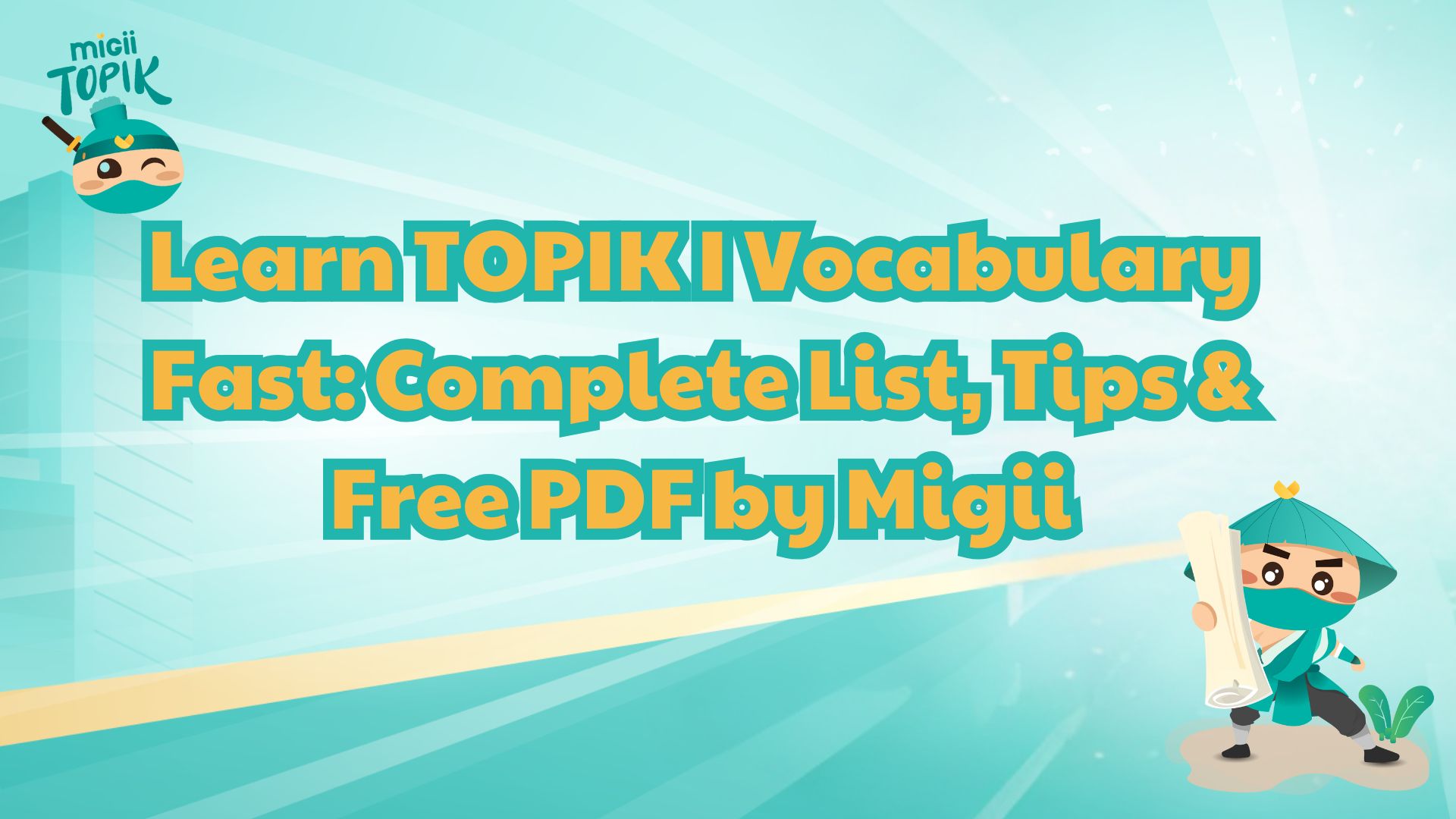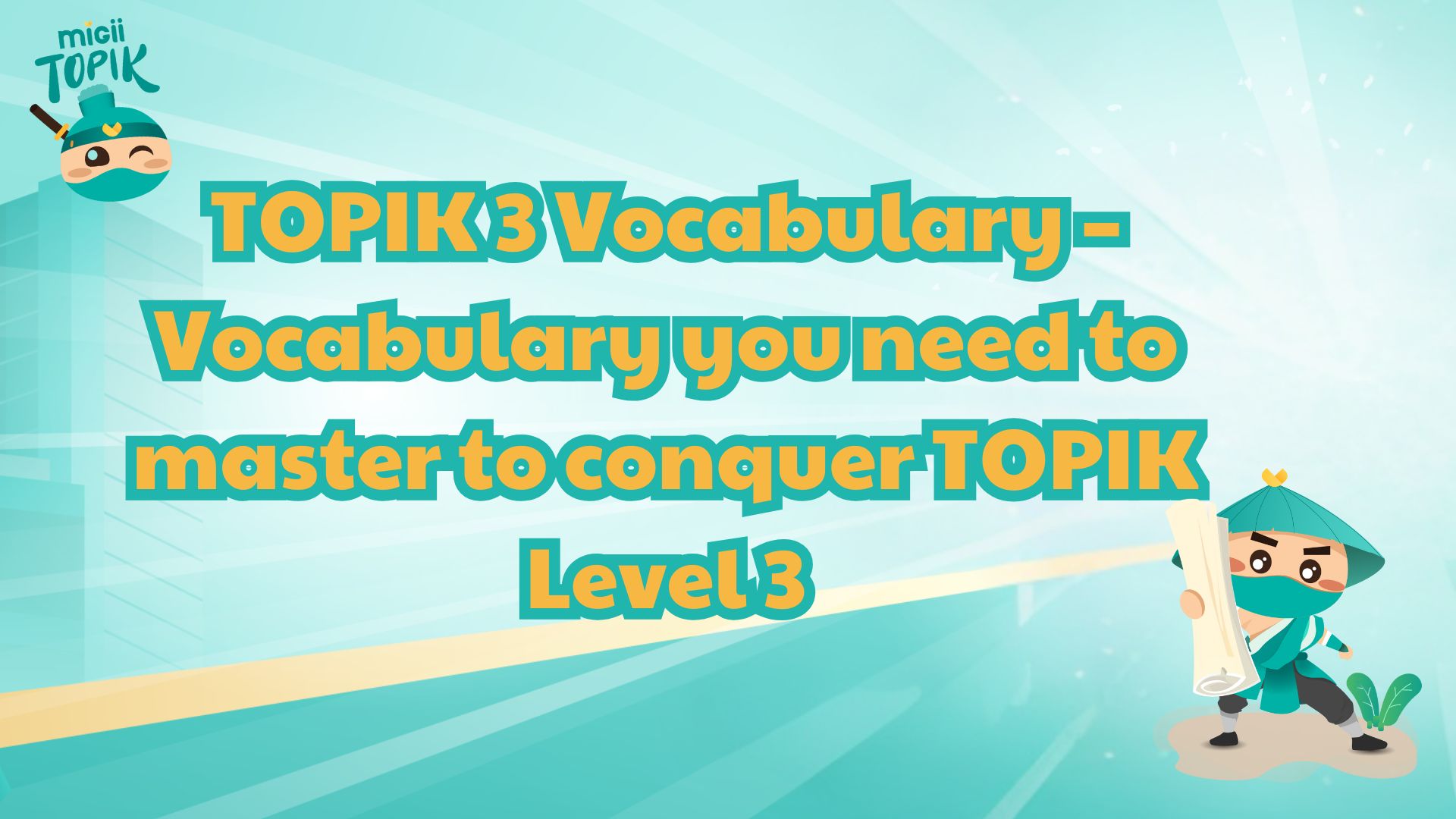The TOPIK 4 vocabulary set includes not only everyday words but also many Sino-Korean terms, idiomatic expressions, and topic-specific words related to society, culture, economy, and education. Building a strong vocabulary foundation at this stage helps learners read news articles, discuss opinions, and write essays with clarity and precision — key skills needed to confidently step into the upper-intermediate level of Korean proficiency.
General introduction to topic 4 vocabulary
The TOPIK (Test of Proficiency in Korean) is a standardized exam designed to assess the Korean language proficiency of non-native speakers in real-life, academic, and professional contexts. Among its levels, TOPIK Level 4 represents an upper-intermediate stage, where learners are expected to understand abstract topics, express personal opinions, and communicate effectively in both formal and informal situations.
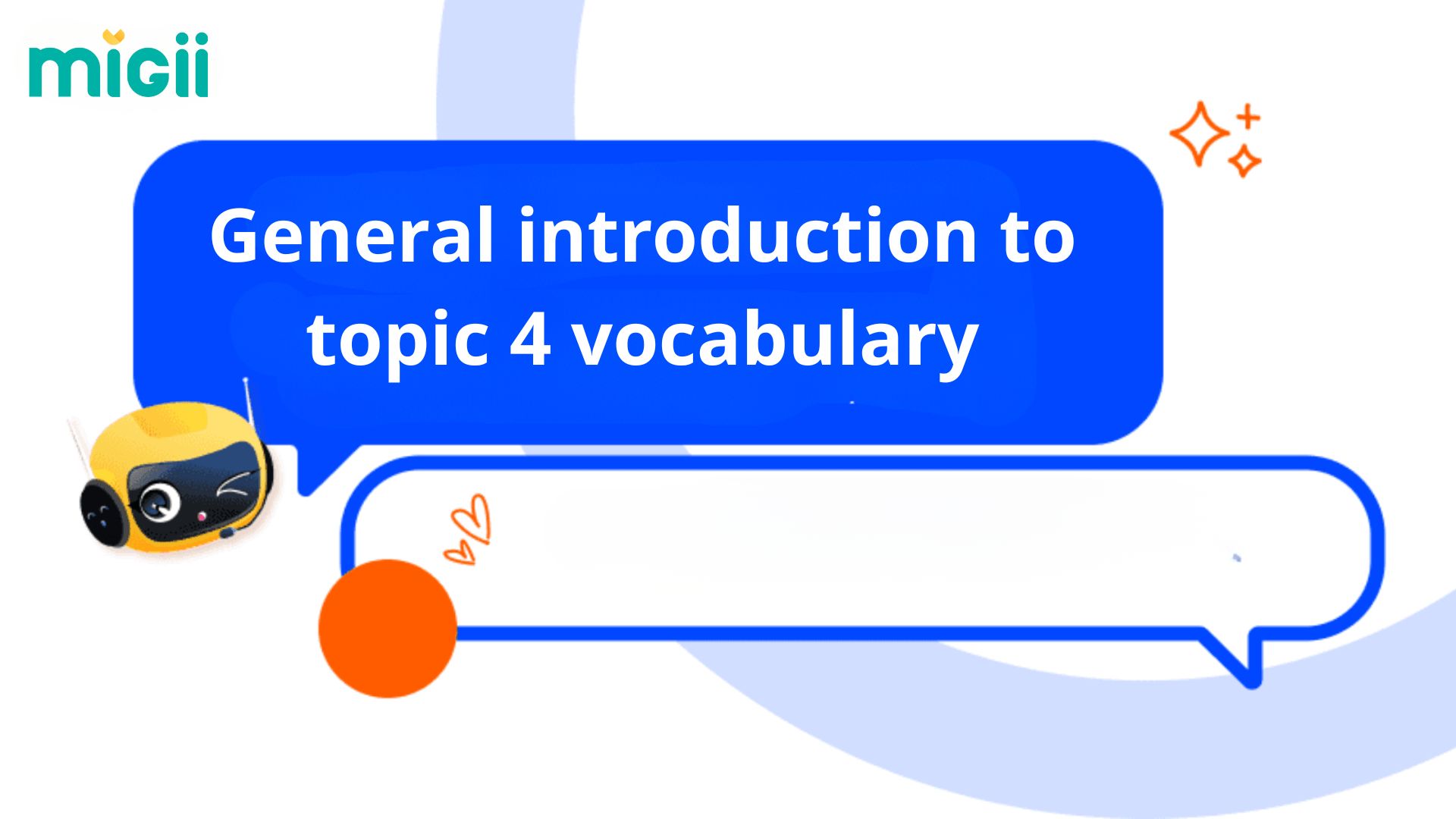
General introduction to topic 4 vocabulary
At this level, vocabulary plays a crucial role. A rich vocabulary not only enhances reading and listening comprehension but also allows learners to express their thoughts accurately and naturally. Without sufficient vocabulary, even strong grammar skills can fall short in real communication.
The goal of this article is to help learners understand the structure, word types, learning strategies, and recommended study materials to successfully master TOPIK 4 Vocabulary — a solid foundation for advancing to the upper-intermediate level in Korean language proficiency.
Overview of TOPIK level 4 vocabulary
To reach TOPIK Level 4, learners are expected to master around 3,000–5,000 words. This level marks the transition from intermediate to upper-intermediate proficiency, where vocabulary is not only used for daily communication but also for understanding and expressing ideas in topics such as society, education, economy, culture, and the environment.
The TOPIK 4 vocabulary set is characterized by a high frequency of Sino-Korean words (한자어), academic terms, and emotional or logical expressions that often appear in essays, news articles, and discussion contexts. Learners need to understand not only the literal meanings but also the nuances and contexts of each word — which is what differentiates TOPIK Level 3 from TOPIK Level 4.
For example, while Level 3 learners often deal with simple daily words, Level 4 includes more abstract and complex vocabulary such as 발전 (development), 영향 (influence), 경험하다 (to experience), and 환경 (environment).
Below is a short sample table of commonly used words in TOPIK 4 Vocabulary:
|
Korean (한국어) |
Meaning (English) |
Part of Speech |
|
변화 (變化) |
Change |
Noun |
|
영향 (影響) |
Influence |
Noun |
|
경험하다 (經驗-) |
To experience |
Verb |
|
발전 (發展) |
Development |
Noun |
|
환경 (環境) |
Environment |
Noun |
This is just a small sample from the 3,000–5,000 essential words needed for TOPIK Level 4.
To learn effectively, it’s best to study vocabulary by topic and in context, so you can understand deeply, remember longer, and use words naturally in reading, writing, listening, and speaking.
Vocabulary groups to prioritize learning in TOPIK Level 4 Vocabulary
When preparing for TOPIK Level 4, it’s important to focus on specific vocabulary groups that frequently appear in reading, listening, and writing tasks. These word sets not only help you understand complex passages but also make your writing and speaking more natural and advanced.
Group 1 – Social and Daily Life Vocabulary (사회 & 생활 어휘)
This group covers the most frequently used vocabulary in articles, essays, and listening sections about daily life and modern society. Learners at TOPIK Level 4 are expected to understand and discuss social topics such as the environment, economy, education, health, and culture. These words help you describe real-world situations and express your opinions about current issues.
Typical examples include:
- 환경 (environment) – môi trường
- 사회 (society) – xã hội
- 경제 (economy) – kinh tế
- 문화 (culture) – văn hóa
- 직업 (occupation) – nghề nghiệp
Example sentence: 환경 문제를 해결하기 위해 모두가 노력해야 한다.
(Everyone must make an effort to solve environmental problems.)
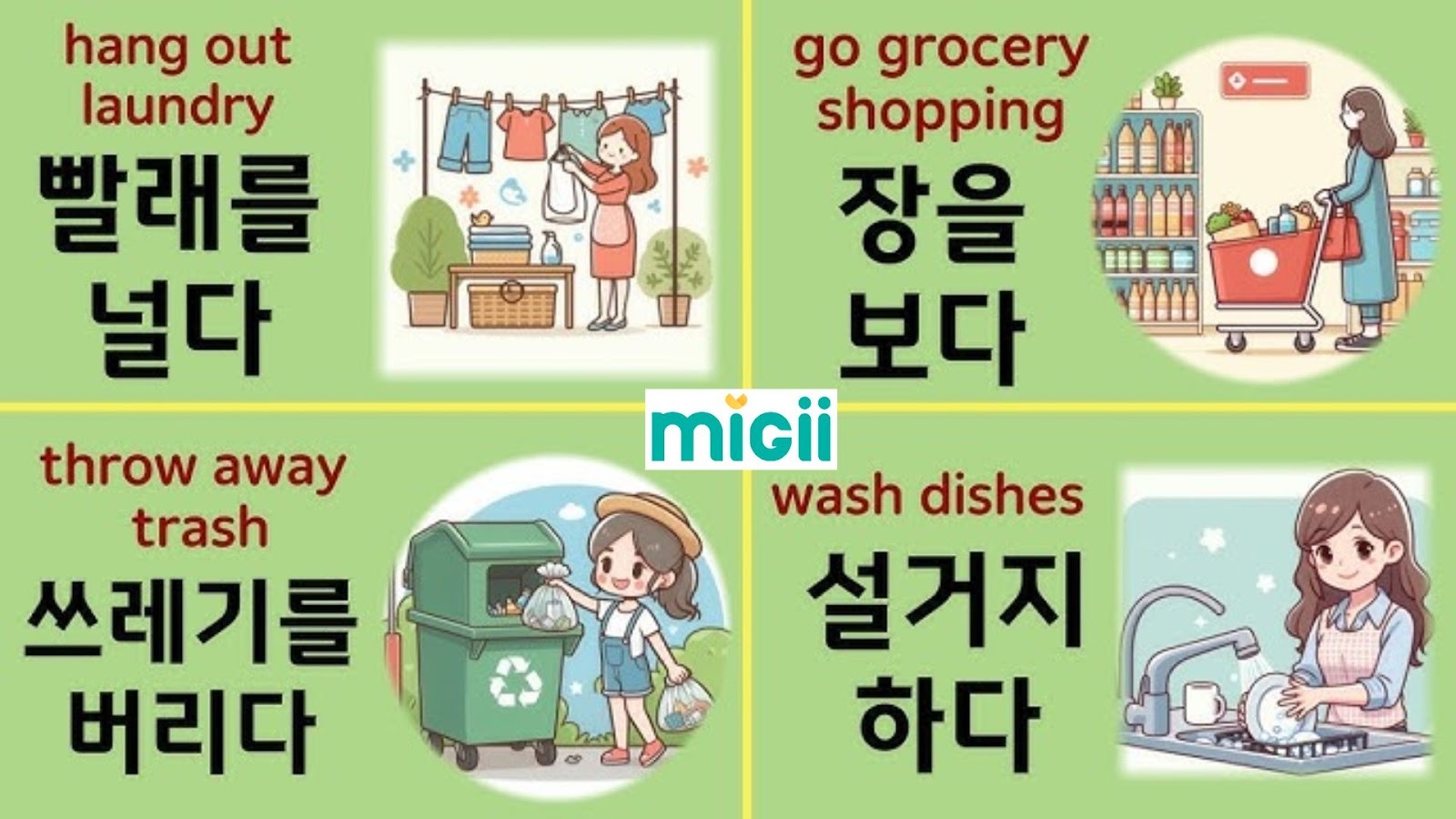
Social and Daily Life Vocabulary Topik 4
Group 2 – Sino-Korean Words (한자어)
A significant portion of TOPIK 4 Vocabulary consists of Sino-Korean words (한자어) — words derived from Chinese characters. These terms often appear in news articles, academic writing, and formal discussions. Understanding the Chinese roots of these words allows learners to recognize meaning patterns, making it easier to guess the meaning of unfamiliar words.
Common examples include:
- 발전 (發展) – development
- 성공 (成功) – success
- 상황 (狀況) – situation
- 계획 (計劃) – plan
- 경험 (經驗) – experience
Example sentence: 회사의 발전을 위해 새로운 계획이 필요하다.
(A new plan is needed for the company’s development.)
Group 3 – Common Academic Verbs and Adjectives (학문적 동사와 형용사)
This group includes verbs and adjectives that frequently appear in essays, reports, and reading passages. They express logical processes, trends, and relationships between ideas — skills that are heavily tested in TOPIK 4. Mastering these words will improve both your comprehension and writing coherence.
Key examples include:
- 포함되다 – to be included
- 증가하다 – to increase
- 유지하다 – to maintain
- 감소하다 – to decrease
- 관련되다 – to be related
Example sentence: 최근 몇 년 동안 인구가 꾸준히 증가하고 있다.
(The population has been steadily increasing over the past few years.)
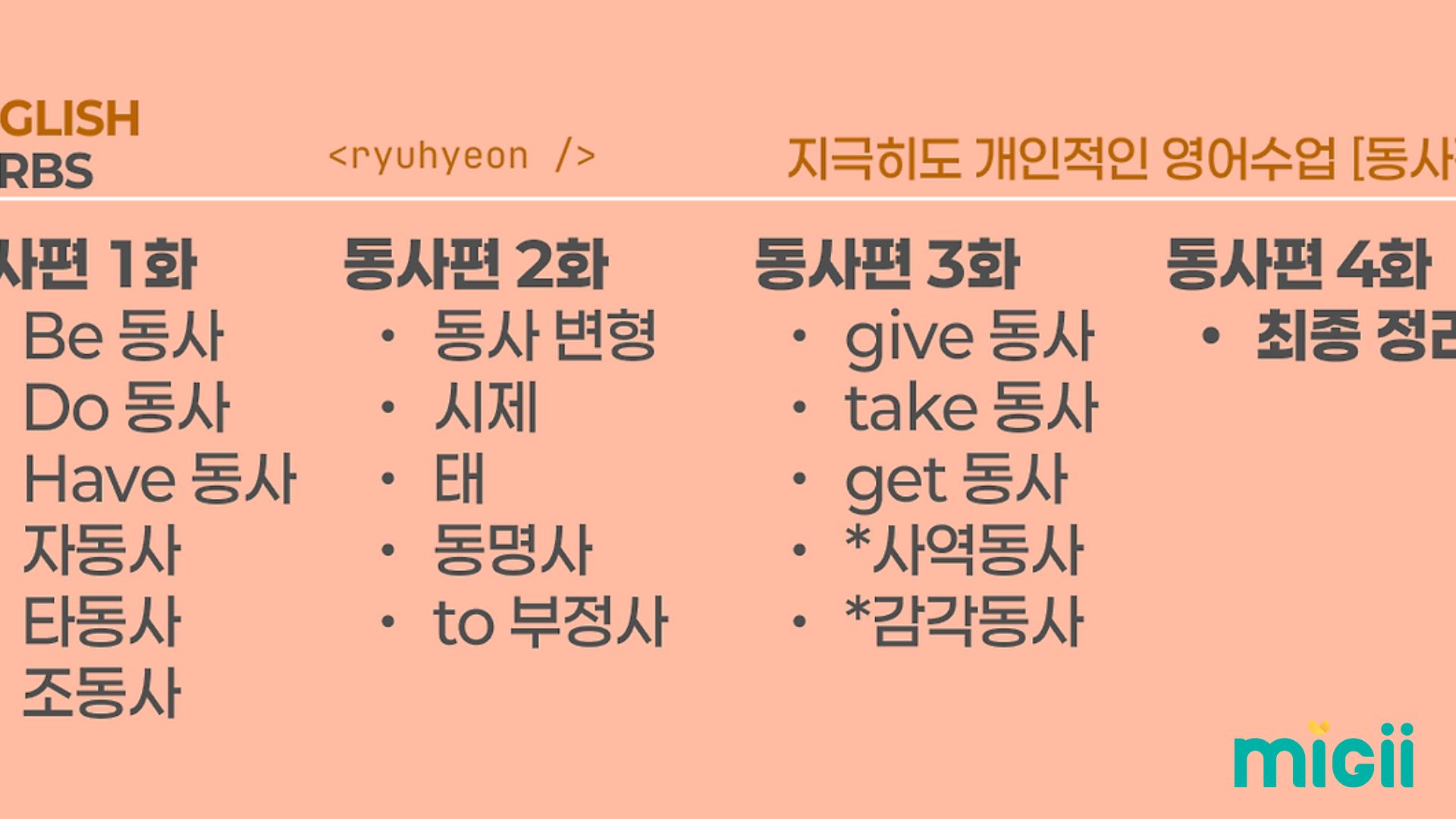
Common Academic Verbs and Adjectives
Group 4 – Linking Expressions and Connectives (연결 표현)
Connective expressions are essential for writing essays and forming logical arguments in TOPIK Level 4. These words help connect sentences smoothly, express cause and effect, contrast, or conclusion. They are especially useful in the 쓰기 (writing) and 읽기 (reading) sections, where cohesive and logical writing is highly valued.
Useful examples include:
- 그러나 – however
- 따라서 – therefore
- 오히려 – on the contrary
- 결국 – in the end
- 게다가 – moreover
Example sentence: 노력했지만 결과는 기대에 미치지 못했다. 그러나 포기하지 않았다.
(I worked hard, but the result didn’t meet my expectations. However, I didn’t give up.)
Effective method to learn TOPIK 4 vocabulary
Learning by Topic to Remember Better and Use Naturally
Learning vocabulary by topic is one of the most effective strategies for mastering TOPIK Level 4. Instead of memorizing random words, organizing your study into meaningful themes helps your brain connect new words with real-life contexts. This not only improves memory but also makes it easier to use the vocabulary naturally when speaking or writing.
Some effective topic-based groups include:
- Daily life: food, clothing, travel, and hobbies — essential for conversations and daily communication.
- Society and culture: traditions, festivals, and social issues — important for essay and reading sections.
- Work and education: office terms, career goals, study habits — frequent in intermediate-level listening and writing tasks.
- Environment and technology: pollution, innovation, climate change — often appear in news-based reading passages.
By studying words through topics, you’ll gradually build word associations and understand how vocabulary fits into real contexts. This approach helps you think in Korean rather than just translating, making your expression smoother and more natural.
To reinforce your learning, it’s crucial to practice these words regularly in context. This list categorizes words by topic, includes example sentences, and provides exercises to help you remember vocabulary deeply and apply it naturally in speaking and writing tasks.
Here are Topik 4 vocabulary download links:
By studying words through topics and practicing with a dedicated vocabulary list, you’ll gradually build word associations, think more in Korean, and express yourself smoothly and confidently.
Repeat Words in Different Contexts at Least Three Times
One of the most powerful ways to make vocabulary stick in your long-term memory is repetition through context. Simply memorizing a word once isn’t enough — your brain needs to see, hear, and use it multiple times to truly remember it. For TOPIK Level 4, aim to meet each new word in at least three different situations or sentences so you can understand how its meaning changes with context.
For example:
- 읽다 (to read): 읽어요 책을 — I read a book.
- 신문을 읽는 게 좋아요 — Reading the newspaper is good.
- 책을 많이 읽으면 어휘력이 늘어요 — If you read a lot, your vocabulary improves.
Practical tips:
- Create short sentences using the same word in various situations.
- Watch dramas or listen to podcasts and note how words appear naturally.
- Review your vocabulary weekly and challenge yourself to use each word in a new context.
Repeating vocabulary in multiple contexts helps you not only remember the word but also understand its nuances and collocations, which is key for achieving fluency at the upper-intermediate level.
Use Flashcards or Vocabulary Apps: Anki, Quizlet, Migii TOPIK
Using digital flashcards is one of the most efficient ways to memorize and review vocabulary for TOPIK Level 4. Apps like Anki, Quizlet, and Migii TOPIK are designed to help you remember words through spaced repetition — a scientifically proven method that optimizes when you review each word so you don’t forget it.
How to use effectively:
- Anki: Create or download decks for TOPIK 4 vocabulary. Review daily following the app’s spaced repetition schedule.
- Quizlet: Add example sentences, images, or audio to make learning more interactive and engaging.
- Migii TOPIK: Focus on vocabulary lists organized by topic and level; test yourself with quizzes that simulate real TOPIK questions.
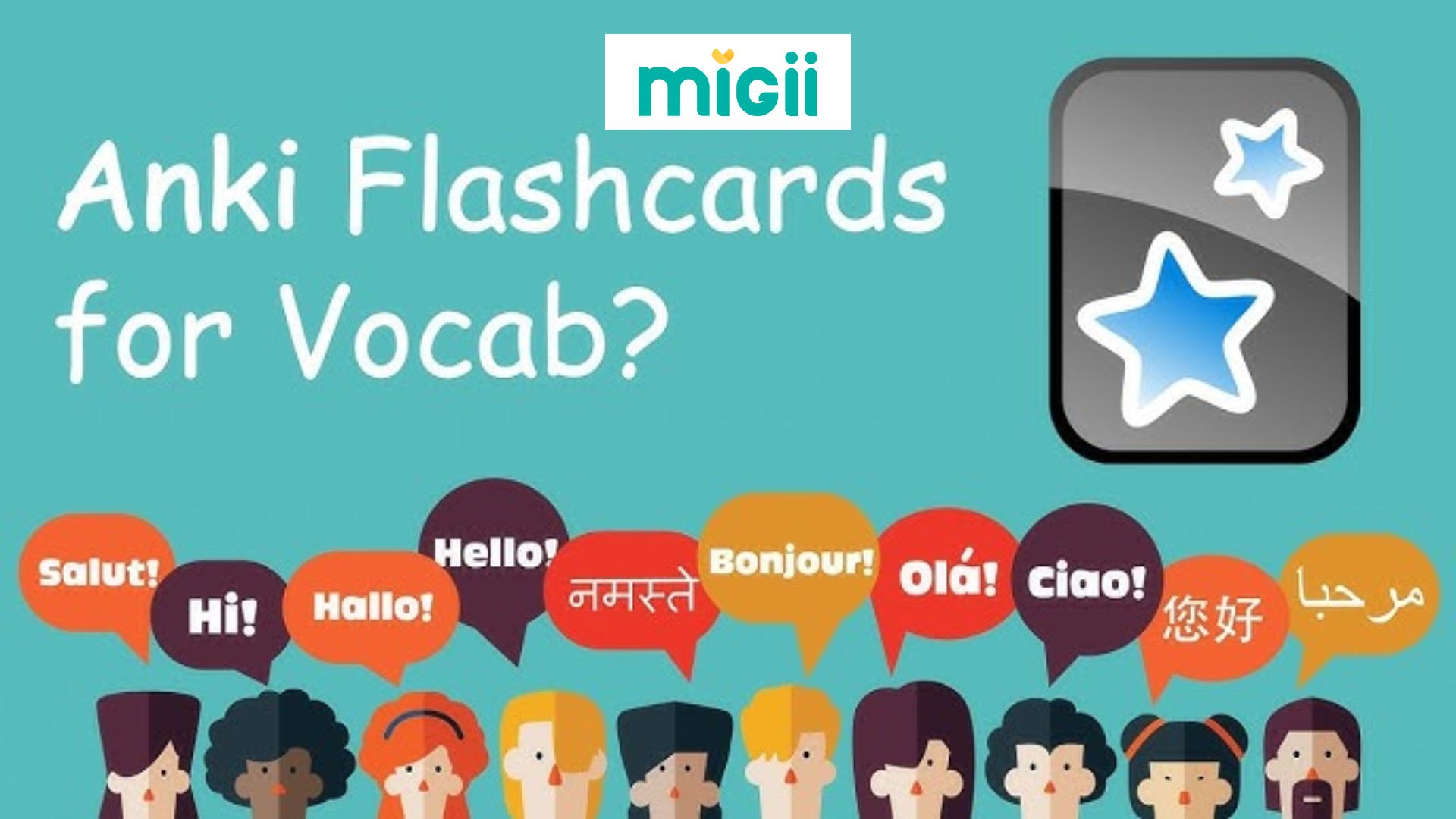
Use Flashcards or Vocabulary Apps
Regular use of these apps not only helps you build vocabulary faster but also allows you to track your progress, identify weak areas, and improve recall speed — all essential for performing well on the TOPIK 4 reading and listening sections.
Write Sentences or Keep a Vocabulary Journal Using New Words
One of the most effective ways to truly remember and internalize new vocabulary is to use it actively in writing. Instead of just memorizing word lists, try creating sentences or short diary entries that include the new words you’ve learned each day. This helps connect vocabulary with real-life situations, making it easier to recall and use naturally during the TOPIK exam.
How to practice effectively:
- Write one or two sentences for each new word to understand its nuance and usage.
- Keep a short daily journal (5–10 sentences) using at least five new words you’ve learned.
- Review your writing regularly to correct mistakes and reinforce memory.
For example:
- 오늘은 새로운 직장에서 경험하다라는 단어를 썼어요. (Today, I used the word “to experience” at my new workplace.)
- 환경 보호는 우리 모두의 책임이라고 생각해요. (I think protecting the environment is everyone’s responsibility.)
By writing regularly, you’ll strengthen both your vocabulary retention and your ability to express ideas naturally in Korean.
TOPIK 4 Vocabulary learning resources
Choosing the right learning materials can make a big difference in your vocabulary progress. For TOPIK Level 4, it’s best to combine structured textbooks with interactive online tools to build both recognition and practical usage skills.
Books:
- TOPIK Master Vocabulary 4 – A well-organized book that covers essential words and example sentences tailored to the TOPIK 4 level.
- Korean Vocabulary for TOPIK II (Intermediate) – Focuses on academic and daily-use vocabulary, ideal for bridging from Level 3 to Level 4.
- TOPIK II Vocabulary in 50 Days is a specialized vocabulary book designed for learners preparing for the TOPIK II exam (intermediate to advanced level).
- Talk To Me In Korean Vocabulary Series – Provides thematic vocabulary with explanations, audio, and sample dialogues for natural learning.
Here are TOPIK II Vocabulary 50 days download links:
Websites & Apps:
- Migii TOPIK: Offers topic-based word lists, practice quizzes, and mock tests.
- Memrise: Uses visual learning and repetition to help you memorize vocabulary effectively.
- TOPIK Guide: Features curated vocabulary lists, grammar summaries, and practice questions.
- Naver Dictionary: A reliable online dictionary with example sentences, pronunciation, and synonyms.
You can also use PDF flashcards or vocabulary lists divided by TOPIK levels for daily review and quick revision before the exam.
Tips for Long-Term Vocabulary Retention
Building a large vocabulary for TOPIK Level 4 is not just about memorizing — it’s about retaining and recalling words naturally over time. To do this effectively, you should combine structured review cycles with active engagement methods that connect words to sound and context.
Key strategies:
- Review in cycles of 1–3–7 days: Revise new words one day, three days, and seven days after learning them to strengthen long-term memory.
- Combine image, sound, and context: Link each word to a mental image, pronunciation, and example sentence so that it becomes meaningful and easier to recall.
- Practice shadowing: Listen to sentences containing new words and repeat them aloud. This improves both pronunciation and contextual understanding.
- Use real TOPIK exam materials: Practice with past TOPIK reading and writing sections to see how vocabulary is used naturally in test contexts.

Tips for Long-Term Vocabulary Retention Topik 4 vocabulary
Following these techniques consistently will help you retain vocabulary longer, recall faster, and apply words more fluently in both speaking and writing during the exam.
Conclusion
Mastering TOPIK 4 Vocabulary is a key step toward achieving upper-intermediate Korean proficiency. A strong vocabulary foundation enhances your reading, listening, and writing skills while helping you communicate naturally and confidently.. For structured practice, tools like Migii TOPIK offer topic-based vocabulary lists and realistic quizzes that mirror the actual exam.


